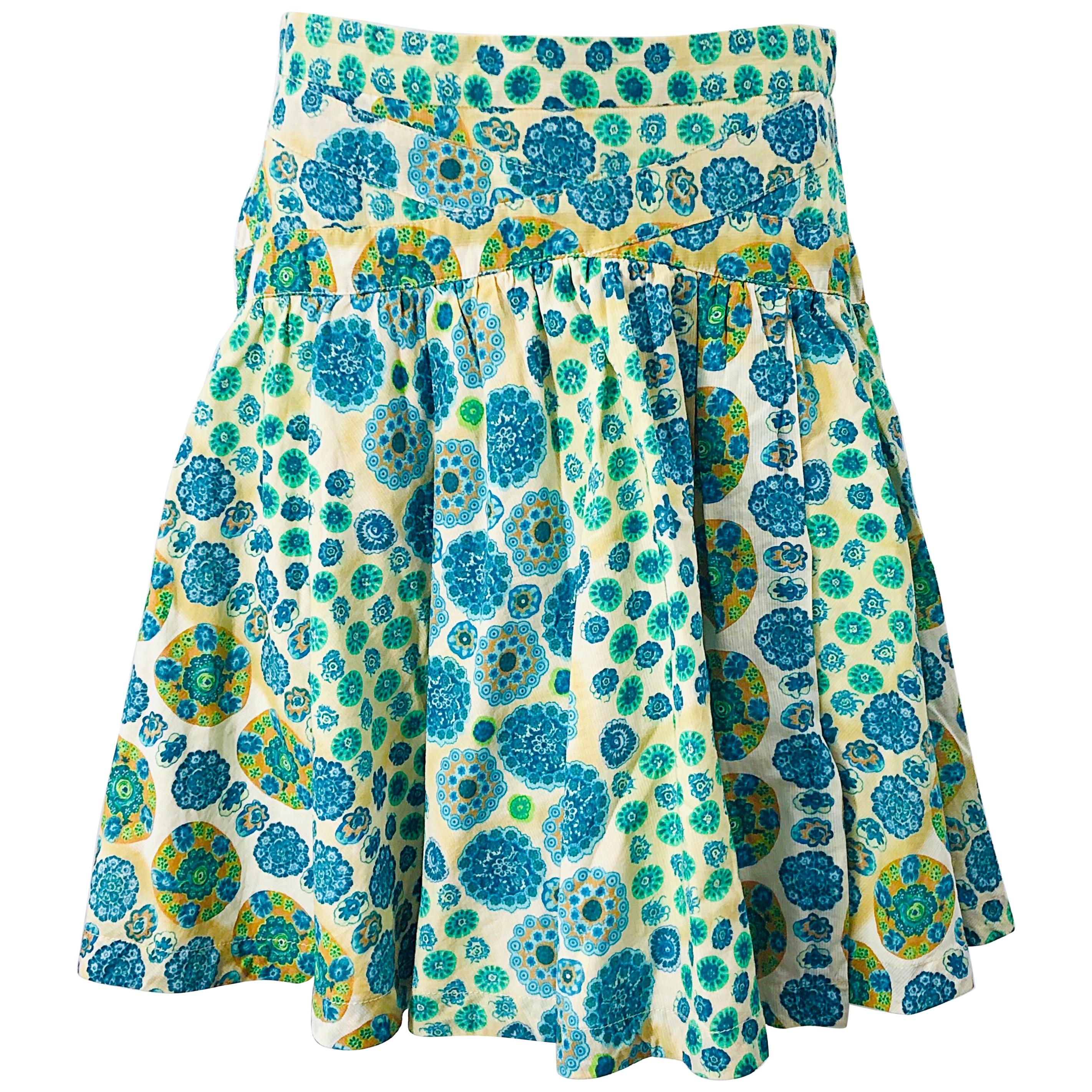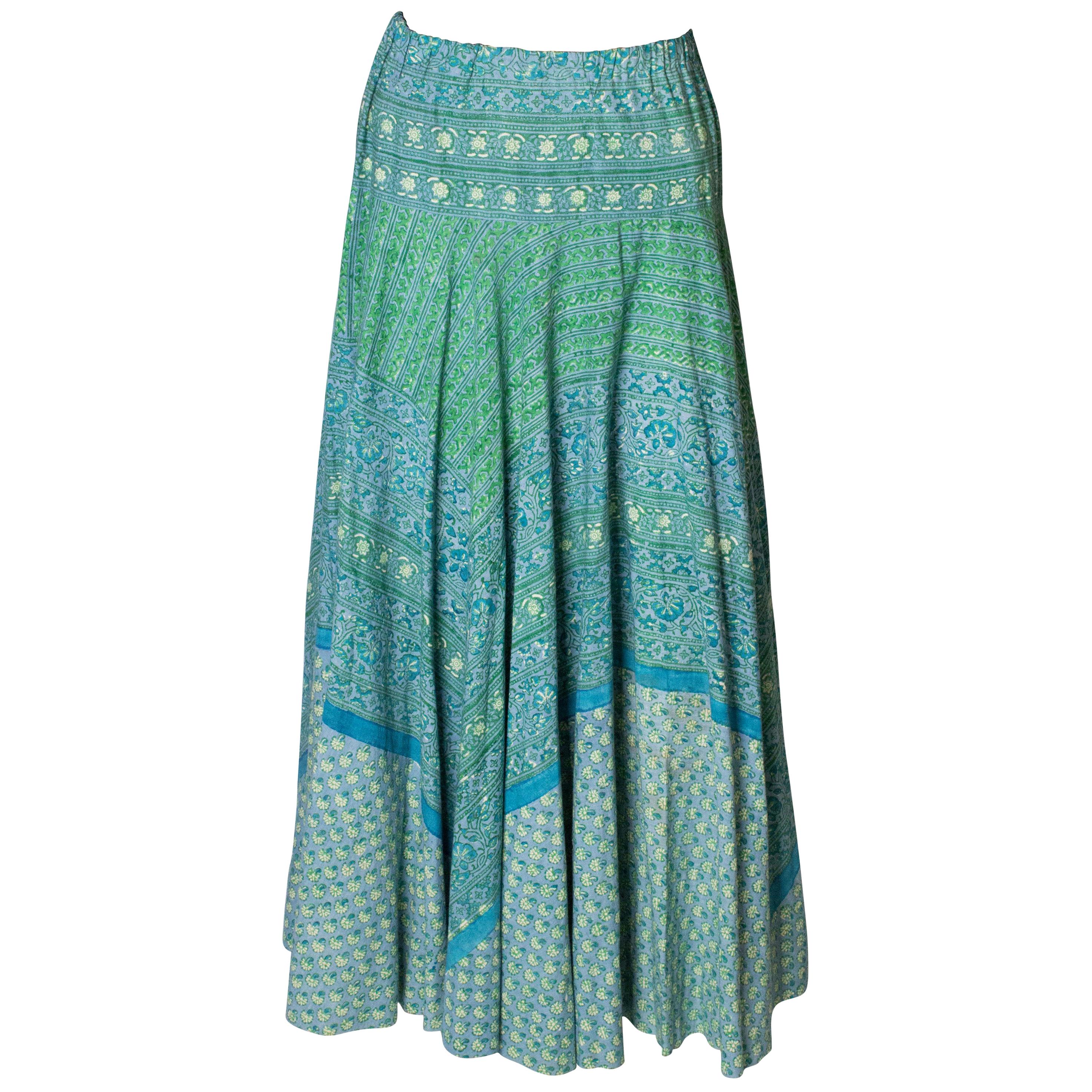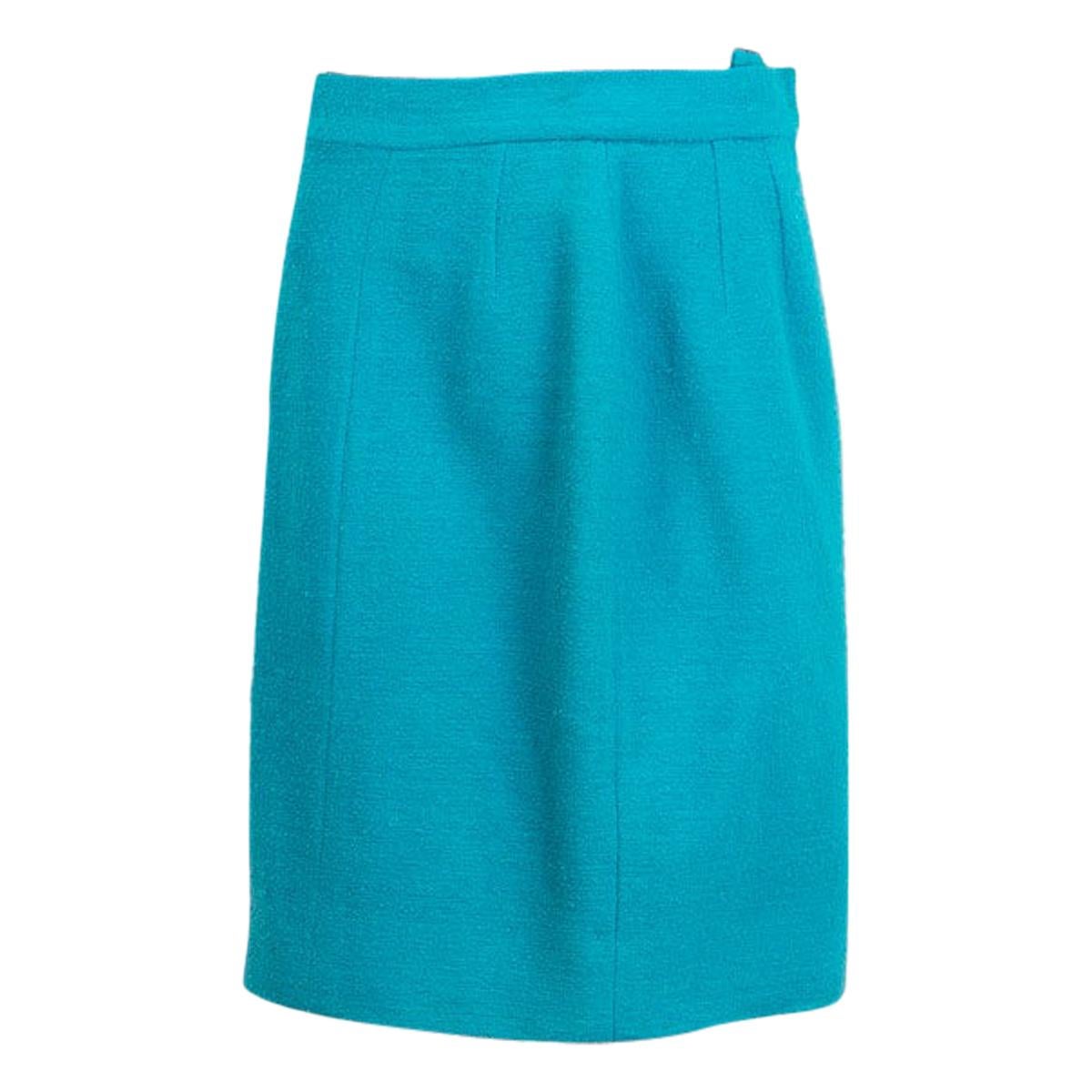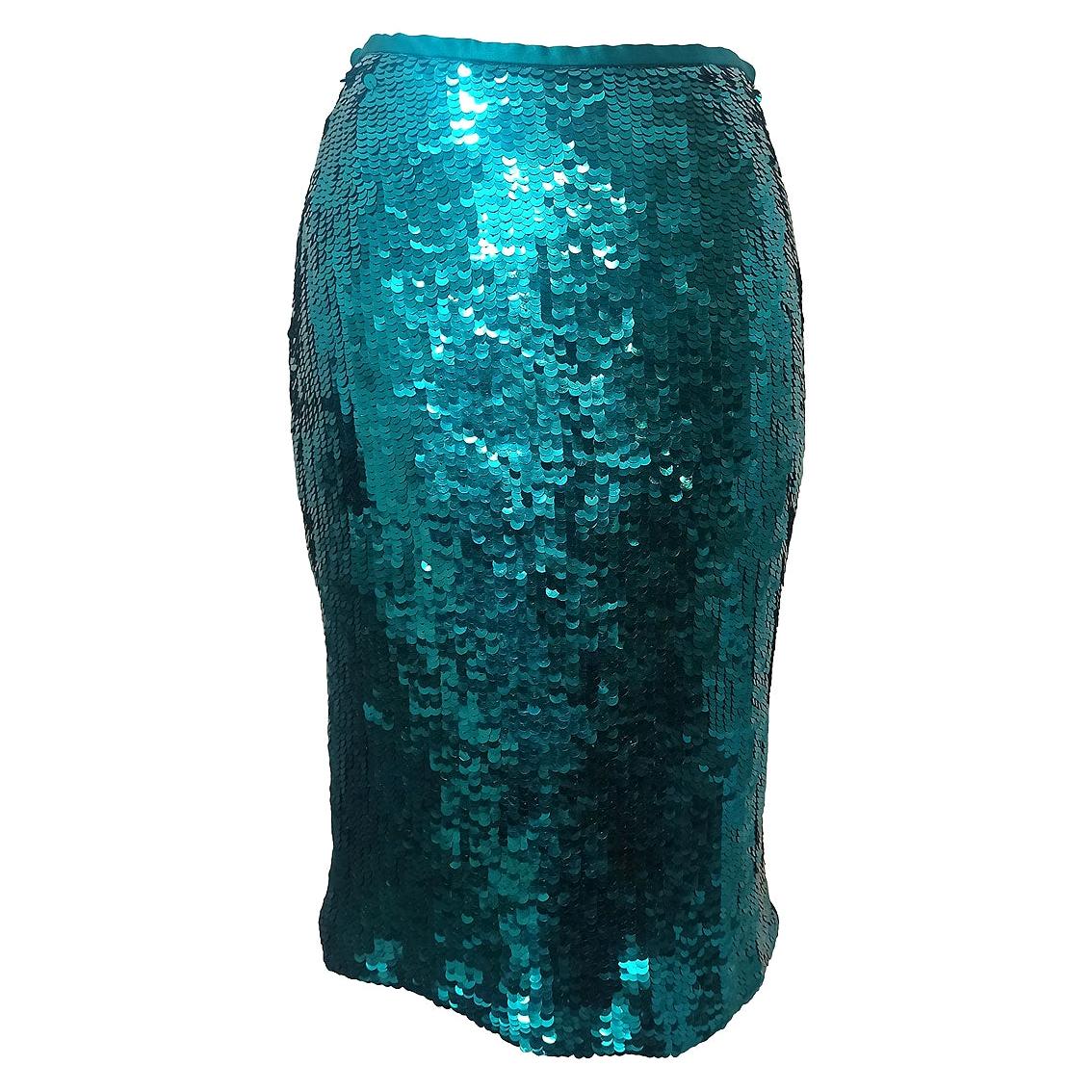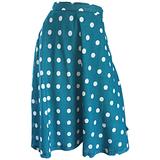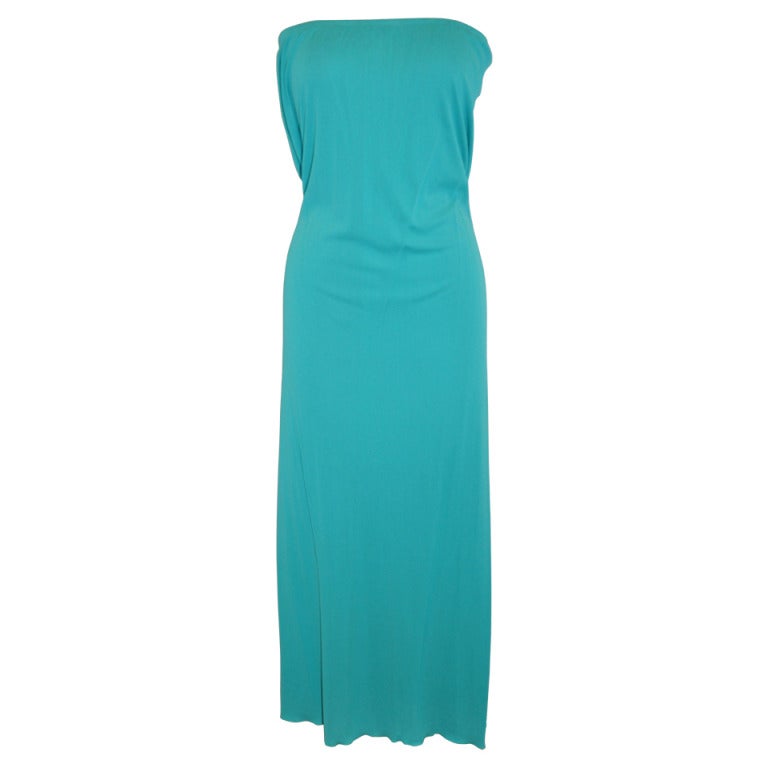S/S 1998 Gucci by Tom Ford Runway Baby Blue Silk Satin Pencil Skirt
About the Item
- Designer:
- Brand:
- Dimensions:Length: 24 in (60.96 cm)Marked Size: IT42 (EU)Waist: 28.5 in (72.39 cm)Hip: 37 in (93.98 cm)
- Place of Origin:Italy
- Period:
- Condition:Wear consistent with age and use. Light wear from age and use throughout, including faint marks to fabric.
- Seller Location:West Hollywood, CA
- Reference Number:1stDibs: LU2388215626672
Tom Ford for Gucci
No one understands sex appeal quite like Tom Ford, who joined Gucci as a womens-wear designer in 1990.
At the time, the internationally renowned Italian label was better known for leather goods than luxury fashion. It was also nearly bankrupt. After creative director Dawn Mello left in 1994, following a Bahrain-based investment group becoming Gucci’s majority shareholder, Ford was named creative director. The American designer soon infused the brand with a fresh sensuality and bold style.
Ford's potent vision of sexed-up femininity spanned everything from shirts to shoes to other accessories at Gucci — he reimagined the house's iconic double-ring-and-bar Horsebit hardware, a reference to the brand’s equestrian history, as a seductive low-slung belt, worn by Madonna when accepting an MTV video music award in 1995. For his fall show during that year, in which Kate Moss walked down the runway in an unbuttoned satin shirt, velvet hip-huggers and tousled hair, heralded an exciting, glammed-up era for the once fusty brand. Vogue critic Sarah Mower called it “one of those hitting-in-the-solar-plexus moments.”
As Ford shot to fame, he continued to explore plunging necklines, such as in the black and white looks of the Fall 1996 collection, and sumptuous fabrics like leather and tweed, with the Fall 2000 ready-to-wear collection ranging from sultry silk evening dresses to plush belted coats.
Ford also cranked up the seduction in the provocative ads for Gucci, particularly with regard to campaigns for Yves Saint Laurent, which the fashion house acquired in 1999 (Ford was also named creative director for YSL and designed the brand’s ready-to-wear collection). Gucci's Fall/Winter 1997 campaign featured Carolyn Murphy grasping Angela Lindvall in what looked like a video still; in another shot, a face pressed against a foot in a lipstick-red heel. Each promoted a vision of modern fashion where women were sexually confident, the materials were luxurious and the styles were fearless.
In 2004, Ford and Gucci president Domenico De Sole left the company after failing to agree on the renewal of their contracts. In 2006, with De Sole as chairman, Ford launched his wildly successful eponymous menswear label. Today Ford is also an author, film director and chairman of the Council of Fashion Designers of America.
Find vintage Tom Ford Gucci day dresses, jackets and handbags on 1stDibs.
Gucci
Long before trend-bucking creative director Alessandro Michele brought his hallucinatory “Utopian Fantasy” campaign to Gucci, it was a modest Italian leather shop. Today, it’s an internationally renowned luxury house with an iconic logo, and vintage Gucci clothing, handbags and shoes are among high fashion's most covetable goods.
Guccio Gucci (1881–1953) admired the stylish suitcases he saw wealthy guests arrive with at the Savoy Hotel in London, where he worked as a bellhop. So, in 1921, after a stint at Franzi, a luggage company in his hometown of Florence, he opened a leather goods shop of his own.
At first, Gucci’s Florence business specialized in equestrian accessories. But as its reputation flourished, particularly among the English aristocracy, so too did its footprint. In 1938, he brought three of his sons — Aldo, Vasco and Rodolfo — into the business and expanded it to Rome and later Milan. In the mid-1930s, a League of Nations embargo against Italy pushed Gucci to experiment with alternatives to imported leather. Its woven hemp fabric from Naples, adorned with the brand’s signature diamond print, was a hit, especially among A-list celebrities. The material was first used on suitcases before finding enduring popularity on handbags. (No list of revered designer purses would be complete without Gucci.)
In the 1950s, Elizabeth Taylor carried one of Gucci’s bamboo-handled tote bags, another adaptation to material rationing. After Jackie Kennedy was seen sporting a slouchy Gucci tote in 1961, it was renamed for the First Lady. Then Grace Kelly, on a visit to the boutique in Milan, inspired Rodolfo Gucci to work with Italian illustrator and Gucci textile designer Vittorio Accornero on the Flora print in 1966. Taking cues from Sandro Botticelli’s Primavera, with its pattern of flora and insects, it was painted entirely by hand and featured no fewer than 37 colors.
In 1953, just 15 days after opening his first store on New York’s 5th Avenue, Guccio passed away at 72. The early 1970s saw store openings in Tokyo and Hong Kong, but by the late 1980s, Gucci was floundering. Rodolfo Gucci took charge in 1982, but family drama and lawsuits ensued. In 1993, Rodolfo’s son, Maurizio, transferred his shares in the company to Investcorp, ending the family’s involvement in Gucci. Dawn Mello, then-president of Bergdorf Goodman, joined as creative director in 1989. But it was Tom Ford, who took over as creative director in 1994, who ultimately revived the brand.
Ford’s racy ads, shot by photographers such as Mario Testino, stirred controversy. And his potent vision of sexed-up femininity — with “jewel-toned satin shirts unbuttoned to there,” as Vogue described his breakthrough 1995 runway show — was wildly successful. The new millennium brought new ownership — Pinault Printemps Redoute in 2004 — and a more toned-down vision from Frida Giannini, who became sole creative director in 2006. Alessandro Michele was named creative director in 2015, and the storied brand took a giant leap forward.
Find vintage Gucci clothing and accessories on 1stDibs.
- ShippingRetrieving quote...Ships From: West Hollywood, CA
- Return PolicyA return for this item may be initiated within 1 day of delivery.
- S/S 2002 Dolce & Gabbana Runway Blue Green Satin Woven Ribbon Mini Skirt Y2KBy Dolce & GabbanaLocated in West Hollywood, CAPresenting a stunning green and blue satin ribbon interlaced mini skirt designed by Dolce & Gabbana for their Spring/Summer 2002 collection. This gorgeous mini skirt debuted as part of look 36 on Anouck Lepère and was worn by Britney Spears to the Madrid premiere of her movie, Crossroads, and by Kylie Minogue to the 2002 Studio NJR Music Awards. Check out our storefront for more iconic Y2K...Category
Early 2000s Italian Pencil Skirts
- NWT F/W 2003 Dolce & Gabbana Runway Blue Fringe Lace-Up Corset Mini SkirtBy Dolce & GabbanaLocated in West Hollywood, CAPresenting an electric blue fringe Dolce and Gabbana mini skirt. From the Fall/Winter 2003 collection, this vibrant skirt features layers ...Category
Early 2000s Italian Pencil Skirts
- F/W 2003 Yves Saint Laurent by Tom Ford Baby Blue Silk Satin Flare SkirtBy Tom Ford for Yves Saint Laurent, Yves Saint Laurent Rive GaucheLocated in West Hollywood, CAPresenting a stunning baby blue satin Yves Saint Laurent Rive Gauche skirt, designed by Tom Ford. From the Fall/Winter 2003 collection, this skirt debuted on the season's runway as p...Category
Early 2000s French Flare Skirts
- S/S 2000 Prada by Miuccia Semi-Sheer Heart Print Chiffon Wrap SkirtBy Miuccia Prada, PradaLocated in West Hollywood, CAPresenting a beautiful semi-sheer Prada lip print wrap skirt. From the Spring/Summer 2000 collection, a version of this skirt debuted on the season’s r...Category
Early 2000s Italian Flare Skirts
- F/W 1992 Gianni Versace Runway Ad Rhinestone Gold Slit Full Length SkirtBy Gianni Versace, Gianni Versace CoutureLocated in West Hollywood, CAPresenting a fabulous black Gianni Versace maxi skirt, designed by Gianni Versace. From the Fall/Winter 'Miss S&M' 1992 collection, this skirt debuted on the season's runway as part ...Category
1990s Italian Pencil Skirts
- 1990s Gianni Versace Couture Black Yellow Chevron Tweed SkirtBy Gianni Versace, Gianni Versace CoutureLocated in West Hollywood, CAPresenting a black and yellow tweed Gianni Versace skirt, designed by Gianni Versace. From the mid 1990s this wool skirt features a chevron pattern throughout. Approximate measurem...Category
1990s Italian Pencil Skirts
- Marc Jacobs 2000s Blue Green Orange Cotton Low Rise Size 2 / 4 SkirtBy Marc JacobsLocated in San Diego, CAChic early 2000s MARC JACOBS blue, green, orange, ivory and yellow low rise cotton skirt ! Features an abstract flower and polka dot print throughout. Hidden zipper up the side with ...Category
Early 2000s A-Line Skirts
- A Vintage 1970s Floral Printed Cotton Boho Summer SkirtLocated in London, GBA great vintage skirt for summer. In a floral printed cotton with an elasticated waist , the skirt is wonderful mixture of greens and blues. The waist measures 28/30 '' with some ...Category
1970s Unknown Skirts
- CHANEL sky blue wool blend Straight Skirt 42 LBy ChanelLocated in Zürich, CH100% authentic Chanel vintage classic straight skirt in sky blue wool (90%) nylon (10%) with two seam details in the front. Lined in sky blue silk (100%). Closes with a concealed zip...Category
21st Century and Contemporary Italian Pencil Skirts
- Dolce & Gabbana Sequins Skirt IT 38By Dolce & GabbanaLocated in Gazzaniga (BG), ITStunning Dolce & Gabbana sequins skirt Silk 100% Green color Sequins Back zip closure Total lenght cm 59 (23,22 inches) Waist cm 34 (13,38 inches) Worl...Category
2010s Italian Skirts
- 1950s Turquoise Blue + White Polka Dot Full Vintage 50s Cotton Voile SkirtLocated in San Diego, CAAdorable 1950s turquoise and white polka dot cotton voile skirt! Features allover printed polka dots. Fine cotton voile, that has incredible movement. Double layered fabric. Extremel...Category
1950s Circle Skirts
- Julio Bold Turquoise Slim-Cut Strapless dress/ Long Evening SkirtBy JulioLocated in New York, NYJulio's bold turquoise slim-cut strapless dress give the option of being able to wear as a long slim evening skirt if desired. The waistband is 1/2" in width circumference measures 2...Category
1970s American Pencil Skirts
